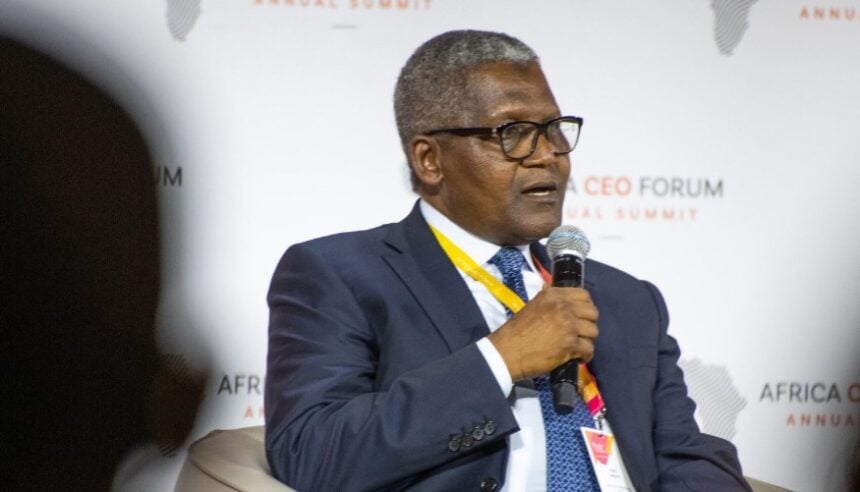

Africa’s richest man, Alhaji Aliko Dangote, has revealed that the Nigerian National Petroleum Company Limited (NNPCL) could soon increase its stake in the $20 billion Dangote Refinery, marking a new chapter in Nigeria’s quest for energy independence and economic transformation. Speaking with confidence about the refinery’s capabilities, Dangote stated that the NNPC currently holds a 7.2 percent stake but has the option to acquire more once the company proves the refinery’s capacity and operational success. His remarks come amid growing anticipation that the refinery—Africa’s largest—will soon hit full operational capacity and change the dynamics of the nation’s fuel market.
Dangote made the disclosure while addressing journalists in Lagos, explaining that his focus at this stage is on proving the refinery’s value and performance. “Once we have demonstrated what this refinery can do, the NNPC can then decide to increase its stake. The opportunity is there,” he said. The comment not only reflects his confidence in the refinery’s long-term prospects but also signals a deepening relationship between his privately-owned enterprise and Nigeria’s state-run oil corporation. The potential move could reshape public-private collaboration in Nigeria’s oil and gas industry, long criticized for inefficiency and overdependence on imports despite being one of Africa’s largest crude producers.
The Dangote Refinery, which has a massive 650,000 barrels per day capacity, is regarded as the single biggest industrial project in Africa and one of the most ambitious in global refining history. Located in the Lekki Free Trade Zone of Lagos, the project has been described by many economists as the game changer that could finally end decades of Nigeria’s dependence on imported refined petroleum products. When fully operational, it is expected to meet all of Nigeria’s refined fuel needs and export the excess, saving the nation billions of dollars in foreign exchange while creating thousands of jobs.
For decades, Nigeria’s four government-owned refineries have remained moribund, guzzling public funds with little or no output. The hope that the Dangote Refinery brings, therefore, extends beyond fuel supply—it touches on national pride, industrial revolution, and economic stability. The refinery’s completion after years of construction delays, financing hurdles, and regulatory bottlenecks stands as a testament to private-sector resilience in a challenging business environment. Dangote’s revelation about NNPC’s potential to deepen its stake has reignited conversations about the government’s role in supporting strategic private ventures without stifling innovation or competition.
The NNPC had initially acquired a 20 percent stake in the refinery in 2021 under former President Muhammadu Buhari’s administration, but that deal was later adjusted to 7.2 percent after a valuation review. The corporation’s investment was seen as a strategic partnership aimed at ensuring Nigeria’s national interest was protected, particularly in securing access to refined products and stabilizing domestic pricing. However, the revised stake suggested both sides were still negotiating long-term terms and expectations. Now, with Dangote’s recent statement, it appears the door is open for fresh talks that could increase government participation once the refinery begins delivering consistent results.
Economic analysts have hailed Dangote’s comments as both pragmatic and strategic. By linking NNPC’s potential stake expansion to proven performance, the billionaire industrialist has placed confidence in transparency and results-driven partnership. “What Dangote is saying in essence is: ‘Let’s deliver first, then you can come in bigger.’ It’s a model that encourages accountability and performance before more government involvement,” one Lagos-based economist noted. This approach contrasts sharply with many past government investments that were politically motivated and financially opaque.
For the Nigerian people, the anticipation is palpable. The refinery, already in the process of producing diesel and aviation fuel, is expected to begin supplying Premium Motor Spirit (petrol) before the end of the year, a move that could drastically reduce fuel scarcity and ease the country’s burden on foreign exchange. With Nigeria currently spending billions of dollars annually on importing refined products, the start of local production on a large scale could stabilize the naira, lower pump prices over time, and strengthen the overall economy. Dangote’s decision to give NNPC room for expansion also suggests a vision that aligns national interests with private efficiency—a balance that Nigeria’s economy has long needed.
Insiders say the partnership between Dangote and NNPC is likely to redefine the oil downstream sector. The refinery’s success could inspire other investors to establish new refineries or invest in petrochemical industries, leading to a ripple effect across the economy. Beyond fuel, the refinery also houses a fertilizer plant, a deep-sea port, and other infrastructure that could turn the Lekki axis into a full-scale industrial hub. If managed well, this could place Nigeria as a dominant player in Africa’s energy and manufacturing markets.
Still, challenges remain. The refinery’s journey has not been without controversy, from funding complexities to accusations of monopoly by smaller marketers. Some industry stakeholders argue that the refinery’s scale could give it excessive market power if not properly regulated. Others, however, believe that the sheer economic benefits outweigh such fears. Dangote himself has repeatedly emphasized that his goal is not monopoly but national development, pointing out that the refinery was built to solve a problem successive governments could not fix. “We invested over $20 billion because we believe in Nigeria. We want to make the country self-sufficient,” he said in a previous interview.
The NNPC, for its part, has also expressed commitment to ensuring the success of the project. Its Group Chief Executive Officer, Mele Kyari, had earlier described the partnership with Dangote as “a landmark moment for Nigeria,” noting that the refinery’s output will boost energy security and make the country a net exporter of petroleum products. Now that Dangote has hinted at a possible increase in the corporation’s stake, industry watchers believe the coming months will be crucial in defining how both entities navigate commercial and national interests.
Observers also note that Dangote’s announcement could send a positive signal to international investors who have been cautious about Nigeria’s oil sector due to policy inconsistency and operational risks. By demonstrating a working partnership between the public and private sectors, the refinery could serve as proof that large-scale industrial ventures are not only possible but also profitable in Nigeria. Such confidence could attract new foreign investments into energy, infrastructure, and manufacturing—sectors that have struggled to reach their full potential.
As Nigerians await full-scale production from the refinery, the spotlight remains firmly on Dangote, whose business empire already spans cement, sugar, and fertilizer. With this refinery, he stands on the brink of not only transforming Nigeria’s oil industry but also reshaping the entire African energy landscape. His invitation to the NNPC to raise its stake, however conditional, is a calculated gesture—one that could forge stronger ties between private innovation and state participation.
If the refinery delivers on its promise, it won’t just be a victory for Dangote—it will be a milestone for Nigeria’s economic rebirth. A future where imported fuel queues become history, where the naira breathes again, and where Africa’s largest economy begins to truly refine its own destiny. For now, all eyes are on the flames of the newly ignited refinery towers in Lekki—a symbol of hope, power, and proof that Nigeria can indeed rise through enterprise.


